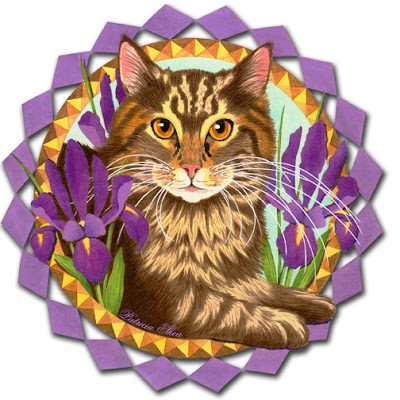In one of my recent posts I mentioned we had a nest just outside our back door and weren't sure if it was a robin's nest or not - now we are sure and today James saw that there are three lovely blue eggs in there! I got a couple of pictures of the Mother Robin on the nest - sorry they are blurry, they were taken through a window at a distance as we didn't want to bug her on the nest. How exciting!
Twice we have had robins in a tree near the house but this is literally out the back door and up 3 feet - they are safe from night prowlers and cosy with a roof from the rain. The robin, thankfully, does not seem at all fazed by the dogs going in and out and the kitchen activity so hopefully soon we'll have three little robin chicks...awwww.
I just went out for a refreshing walk on a Maine spring evening after spending a few hours on the computer. I walked along the side of a couple of babbling, mossy brooks and was reminded of one of my favourite poems by Alfred Lord Tennyson:
The Brook
I come from haunts of coot and hern;
I come from haunts of coot and hern;
I make a sudden sally
And sparkle out among the fern,
To bicker down a valley.
By thirty hills I hurry down,
Or slip between the ridges,
By twenty thorpes, a little town,
And half a hundred bridges.
Till last by Philip's farm I flow
To join the brimming river,
For men may come and men may go,
But I go on for ever.
I chatter over stony ways,
In little sharps and trebles,
I bubble into eddying bays,
I babble on the pebbles.
With many a curve my banks I fret
By many a field and fallow,
And many a fairy foreland set
With willow-weed and mallow.
I chatter, chatter, as I flow
To join the brimming river,
For men may come and men may go,
But I go on for ever.
I wind about, and in and out,
With here a blossom sailing,
And here and there a lusty trout,
And here and there a grayling,
And here and there a foamy flake
Upon me, as I travel
With many a silvery water break
Above the golden gravel,
And draw them all along, and flow
To join the brimming river
For men may come and men may go,
But I go on for ever.
I steal by lawns and grassy plots,
I slide by hazel covers
I move the sweet forget-me-nots
That grow for happy lovers.
I slip, I slide, I gloom, I glance,
Among my skimming swallows;
I make the netted sunbeam dance
Against my sandy shallows.
I murmur under moon and stars
In brambly wildernesses;
I linger by my shingly bars;
I loiter round my cresses;
And out again I curve and flow
To join the brimming river,
For men may come and men may go,
But I go on for ever.
By Lord Tennyson
About The Poet :
Lord Tennyson (1809-92) was born in Lincolnshire. Poet Laureate for over 40 years, Tennyson is representative of the Victorian age. His skilled craftsmanship and noble ideals retained a large audience for poetry in an age when the novel was engrossing more and more readers. Tennyson's real contribution lies in his shorter poems like The Lady of Shallot, The Princess, Ulysses, The Palace of Art etc. His fame rests on his perfect control of sound, the synthesis of sound and meaning, the union of pictorial and musical.
By Lord Tennyson
About The Poet :
Lord Tennyson (1809-92) was born in Lincolnshire. Poet Laureate for over 40 years, Tennyson is representative of the Victorian age. His skilled craftsmanship and noble ideals retained a large audience for poetry in an age when the novel was engrossing more and more readers. Tennyson's real contribution lies in his shorter poems like The Lady of Shallot, The Princess, Ulysses, The Palace of Art etc. His fame rests on his perfect control of sound, the synthesis of sound and meaning, the union of pictorial and musical.
Definitions of some of the lesser known words:
Coot : a type of water bird with a white spot on the forehead
Hern : heron
Hern : heron
Thorpes : a type of village
Grayling : another type of fish





































